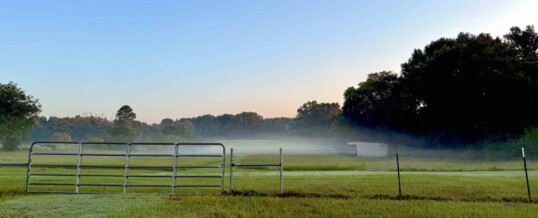
Hard work has a way of shaping a person that no shortcut or modern convenience can replicate. In an era when many of life’s daily tasks have been automated, it’s easy to forget the lessons hidden in a long day’s labor. Yet the lessons of discipline, patience, and resilience are precisely the ones that give life a deeper sense of purpose and fulfillment.
That’s true for most folks who grew up in the South during the 1960s and 70s; a time when doing things by hand was a necessity and not a hobby.
Those experiences, and the recent chance to relive them with my own son, reminded me that true satisfaction often comes with calloused hands and sore muscles.
My wife and I live on a 10-acre homestead and heat our home and my workshop with woodstoves. Woodstoves, of course, require wood. Requiring wood requires manual labor. And at our place, the process of preparing winter fuel is a family tradition.
My father used to buy wood already cut into twenty-inch sections, but the rest (splitting, stacking, hauling) was up to me. Back then, my only tools were a maul, a sledgehammer, an axe, and a young back.
Those days taught me lessons no classroom could match: how to manage time, how to budget strength so you still have energy at the end of the day, and how to appreciate the source of the heat that kept our home warm. As I worked alongside my son, I saw the same lessons (ones he learned early in life) continue to take root in him. Hard work becomes a bridge across generations.
The summers of the 70s brought their own schooling. Anyone who has hauled and stacked hay under an Arkansas sun knows the meaning of sweating. You haven’t truly worked hard until you’ve tried to keep pace with a crew of young men tossing heavy, scratchy bales onto a trailer or flatbed truck as the humidity wraps around you like a wet blanket.
Hay fields taught endurance and teamwork. They also offered a deep sense of pride when the truck or trailer was full and the last bale was stacked high.
The family garden carried a different rhythm but equally valuable lessons. Today, a quick trip to the store provides dinner without much thought, but when I was a boy, almost every vegetable we ate came from our backyard. Running a tiller to break the ground, carving straight rows with a hoe, and carefully planting seeds in spring or fall taught patience and planning.
Harvest time was a family celebration. I learned more about my heritage shelling peas beside my grandmother than at any other moment of my life. The work itself echoed the old fable of the ant and the grasshopper: prepare diligently, or go without when others are eating.
Each new skill acquired under my father’s and grandfathers’ guidance gave me confidence and pride, along with the knowledge that I could care for my own home and family.
Of course there are limits, but learning to meet life’s ordinary challenges with your own two hands builds character that no amount of convenience can replace. The satisfaction of a repaired fence, a freshly split stack of firewood, or a home-cooked meal from your own garden nourishes more than the body; it feeds the soul.
Today we enjoy more comfort and automation than the world in which I grew up, and I’m grateful for that progress. But we lose something vital when we avoid hard work entirely.
Physical effort connects us to the sources of our comfort. Whether it’s the wood that warms us, the food that sustains us, or the shelter that protects us. It also connects us to each other through shared labor and the stories that flow while we’re working.
My parents and grandparents gave me more than practical skills; they passed on the understanding that work itself can be a source of joy and identity.
I hope to continue to do the same for my children and grandchildren. To love your family is to equip them not just with comforts, but with the confidence to create those comforts through their own effort.
That is the lasting gift of hard work: a sense of purpose, a deep fulfillment, and the knowledge of how things actually get done.
Growing up, hard work came in the form of skills that today might be labeled “DIY,” but for us were necessary. Carpentry, basic plumbing, automotive maintenance, and even simple electrical repair were all part of daily life. We couldn’t afford to hire professionals for every small problem, so we learned to fix what was broken. That self-reliance was empowering. It still is.
© 2025 John Moore
John’s, Puns for Groan People (a book of dad jokes); and two volumes about growing up in the South called, “Write of Passage,” are available at TheCountryWriter.com. John would like to hear from you at John@TheCountryWriter.com.
SEP
2025
